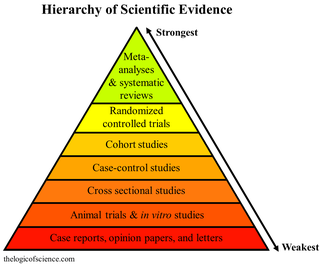Related Research Articles

Medicine is the science and practice of caring for patients, managing the diagnosis, prognosis, prevention, treatment, palliation of their injury or disease, and promoting their health. Medicine encompasses a variety of health care practices evolved to maintain and restore health by the prevention and treatment of illness. Contemporary medicine applies biomedical sciences, biomedical research, genetics, and medical technology to diagnose, treat, and prevent injury and disease, typically through pharmaceuticals or surgery, but also through therapies as diverse as psychotherapy, external splints and traction, medical devices, biologics, and ionizing radiation, amongst others.
Archibald Leman Cochrane was a Scottish physician noted for his book, Effectiveness and Efficiency: Random Reflections on Health Services, which advocated the use of randomized controlled trials (RCTs) to improve clinical trials and medical interventions. His advocacy of RCTs eventually led to the creation of the Cochrane Library database of systematic reviews, the UK Cochrane Centre in Oxford and Cochrane, an international organization of review groups that are based at research institutions worldwide. He is known as one of the fathers of modern clinical epidemiology and is considered to be the originator of the idea of evidence-based medicine. The Archie Cochrane Archive is held at the Archie Cochrane Library at University Hospital Llandough, Penarth.

Cochrane is a British international charitable organisation formed to synthesize medical research findings to facilitate evidence-based choices about health interventions involving health professionals, patients and policy makers. It includes 53 review groups that are based at research institutions worldwide. Cochrane has over 37,000 volunteer experts from around the world.

Krems an der Donau is a town with 25,271 inhabitants end 2022 in Austria, in the federal state of Lower Austria. It is the fifth-largest city of Lower Austria and is approximately 70 kilometres west of Vienna. Krems is a city with its own statute, and therefore it is both a municipality and a district.

The University for Continuing Education Krems is an Austrian university specializing in further education for working professionals. It is located in Krems an der Donau, Lower Austria.
The Medical University of Vienna is a public university located in Vienna, Austria. It is the direct successor to the faculty of medicine at the University of Vienna, founded in 1365 by Rudolf IV, Duke of Austria. As one of the oldest medical schools in the world, it is the oldest in the German-speaking countries, and was the second medical faculty in the Holy Roman Empire, after the Charles University of Prague.

A systematic review is a scholarly synthesis of the evidence on a clearly presented topic using critical methods to identify, define and assess research on the topic. A systematic review extracts and interprets data from published studies on the topic, then analyzes, describes, critically appraises and summarizes interpretations into a refined evidence-based conclusion. For example, a systematic review of randomized controlled trials is a way of summarizing and implementing evidence-based medicine.

Gordon Henry Guyatt is a Canadian physician who is Distinguished University Professor in the Departments of Health Research Methods, Evidence and Impact and Medicine at McMaster University in Hamilton, Ontario. He is known for his leadership in evidence-based medicine, a term that first appeared in a single-author paper he published in 1991. Subsequently, a 1992 JAMA article that Guyatt led proved instrumental in bringing the concept of evidence-based medicine to the world's attention.[2] In 2007, The BMJ launched an international election for the most important contributions to healthcare. Evidence-based medicine came 7th, ahead of the computer and medical imaging. [3][4] Guyatt's concerns with the role of the medical system, social justice, and medical reform remain central issues that he promoted in tandem with his medical work. On October 9, 2015, he was named to the Canadian Medical Hall of Fame.

Reproductive medicine is a branch of medicine concerning the male and female reproductive systems. It encompasses a variety of reproductive conditions, their prevention and assessment, as well as their subsequent treatment and prognosis.

The German Network for Evidence based Medicine is a scientific nonprofit association of individuals and institutions promoting the quality of patient care and disease prevention by applying the principles of evidence-based healthcare (EbHC) - in special dentistry (EbD), medicine (EbM), nursing (EbN), pharmacy, physiotherapy - in the countries of German language.
Peter Christian Gøtzsche is a Danish physician, medical researcher, and former leader of the Nordic Cochrane Center at Rigshospitalet in Copenhagen, Denmark. He is a co-founder of the Cochrane Collaboration and has written numerous reviews for the organization. His membership in Cochrane was terminated by its Governing Board of Trustees on 25 September 2018. During the COVID-19 pandemic, Gøtzsche was criticised for spreading disinformation about COVID-19 vaccines.

James M. Heilman is a Canadian emergency physician, Wikipedian, and advocate for the improvement of Wikipedia's health-related content. He encourages other clinicians to contribute to the online encyclopedia.
The Vienna School of Osteopathy (WSO) is a private educational institution in Austria specialising in osteopathy. Extra occupational and postgraduate trainings are offered for physiotherapists and doctors of medicine. University programmes are also open for graduates from other osteopathy schools. Up to now 550 students finished their training and currently 350 students are enrolled in training groups. Established in 1991, the WSO was the first provider of osteopathic training at academic level in Austria. It is located in Vienna, Hietzing at Frimbergergasse 6.
Kameshwar Prasad is an Indian neurologist, medical researcher, academic and the head of the Department of Neurology at the All India Institute of Medical Sciences, Delhi (AIIMS), known as a proponent of evidence-based medicine (EBM) and evidence-based healthcare (EBHC). The government of India awarded him the fourth highest civilian honour of the Padma Shri in 1991.
Holger Jens Schünemann is a physician and professor of Preventive Medicine and Public Health and professor emeritus of medicine and Clinical epidemiology. Since 1 December 2023 he is Director of the Clinical Epidemiology and Research Center (CERC) at Humanitas University. From 1 February 2009 to 30 June 2019 he was the chair of the Department of Health Research Methods, Evidence, and Impact at McMaster University in Hamilton, Canada, where he now works as full professor.
The Complexity Science Hub Vienna (CSH) is a Vienna-based research organisation with the aim to bundle, coordinate and advance the research of complex systems, system analysis and big data science in Austria.

Robert Brian Haynes OC is a Canadian physician, clinical epidemiologist, researcher and an academic. He is professor emeritus at McMaster University and one of the founders of evidence-based medicine.
Michael Brainin is an Austrian neurologist and emeritus professor at the Danube University Krems. He is widely known as a pioneer in stroke research and prevention as well as a leading figure in the development of stroke units. Brainin was president of the Austrian Stroke Society, the European Stroke Organisation and the World Stroke Organization.

Daniel Aletaha is an Austrian physician and professor of rheumatology. He has been head of the Department of Rheumatology at the Medical University of Vienna since 1 July 2019, and the President of the European Alliance of Associations for Rheumatology (EULAR) since 2023.
References
- ↑ "Gerald Gartlehner". Clarivate. Retrieved 16 November 2023.
- ↑ "WHO collaborates with Danube University Krems". Danube University Krems. Retrieved 23 April 2021.
- ↑ "Team of Cochrane Austria". Cochrane Austria. Cochrane Austria. Retrieved 23 April 2021.
- ↑ "Gerald Gartlehner". RTI. October 2021. Retrieved 11 October 2021.
- ↑ "Statement from Cochrane's Governing Board – Wednesday 26th September 2018". Cochrane Denmark. Cochrane Denmark. Retrieved 23 April 2021.
- ↑ Enserink, Martin. "Evidence-based medicine group in turmoil after expulsion of co-founder". Science. Retrieved 23 April 2021.
- ↑ "Gartlehner, Gerald". Université de Paris. Retrieved 23 April 2021.
- ↑ "Bodies and committees". IQWIG. Retrieved 23 April 2021.
- ↑ "Neukonstituierung des Obersten Sanitätsrates". Austrian Ministry of Social Affairs, Health, Care and Consumer Protection. Retrieved 23 April 2021.
- ↑ "Coronavirus: Donau-Uni hilft WHO". ORF . 5 February 2020. Retrieved 23 April 2021.